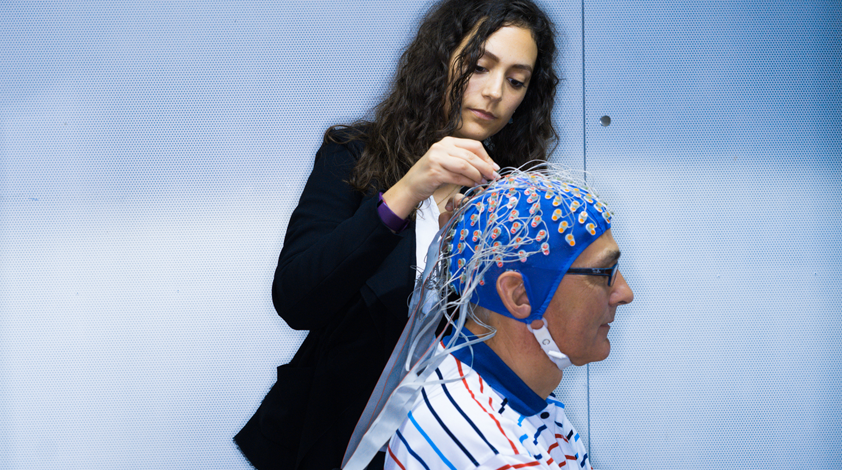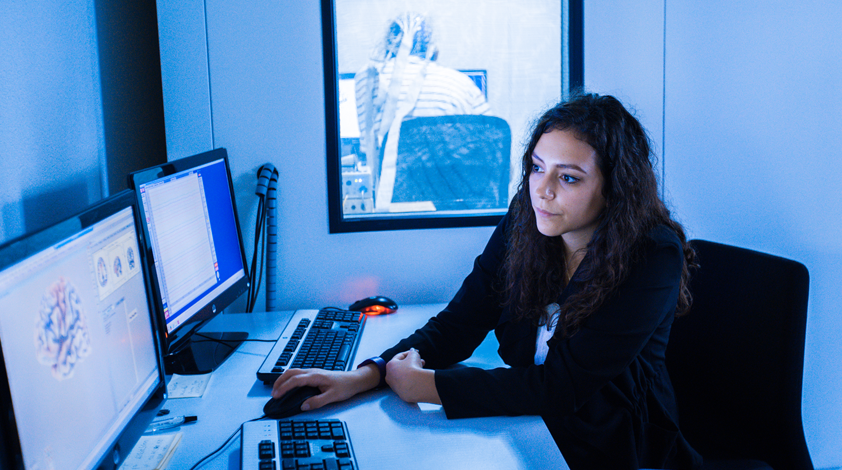With support from Sonova, a globally unique study by the University of Zurich has managed to measure and visually map the consequences of age-related hearing loss in the brain. The results? In the event of hearing loss, the brain requires intensive training to regain a better understanding of speech using hearing instruments.
The human body deteriorates as it ages – this is an entirely normal development that happens to everyone. This aging process also affects the hearing, which is why many older people eventually need a hearing aid. Age-related hearing loss was once attributed solely to exterior wear and tear within the cochlea, the inner ear, but science has more recently come to the realization that the normal aging process also makes it more difficult for the brain to process speech. The thinner auditory cortex in the brains of older people is responsible for this change.
A globally unique study carried out in close cooperation with Sonova has now allowed a group of neuropsychologists from the University of Zurich to examine and visually map age-related hearing loss in the brain. “We wanted to know how the brain is able to process speech in old age and also how it is able to re-learn this ability, especially when the person has been affected by hearing loss and wears hearing aids,” says Nathalie Giroud, who is studying for a doctorate in neuropsychology at the University of Zurich.
The study*, which lasted two-and-a-half years, saw Giroud investigating how well and how quickly the brain is able to learn in old age. Her research is globally unique in that it represents the first successful attempt in a long-term study to scientifically measure the efforts the brain makes to react to language. The 15 younger and 45 more senior test subjects selected for the study took part in hearing tests at regular intervals over a period of several weeks. The group of older test subjects included both hearing aid wearers and people unaffected by hearing loss.

Nathalie Giroud prepares one of the test subjects for the hearing test: 64-year-old civil engineer Fritz Jäckli can still hear very well without a hearing aid, but he has learnt something new and important from taking part in the study: "If I ever notice that my hearing is getting worse, I certainly won hesitate to get a hearing aid."
The study’s most important finding is that with older people affected by hearing loss who get a hearing aid for the first time, and even with those who change hearing instruments, the brain requires some twelve weeks of intensive training to be able to process speech even nearly as well as before,” says Giroud, adding that intensive training means wearing the hearing aid for the whole day – twelve hours at least. “A lot of people with hearing loss think that a hearing instrument will help them right off the bat, but you just need to have a bit of patience,” the doctoral student explains. The study has now been able to measure – and for the first time scientifically confirm – a finding that hearing care professionals and audiologists have long known about from daily experience. As Nathalie Giroud explains: “This has made clear that we have to redefine hearing loss and can no longer reduce it exclusively to age-related damage to the inner ear.

Nathalie Giroud evaluating the test results. Specific expertise and experience are required in this challenging research field.
Stefan Launer, Sonova’s Senior Vice President Science & Technology, considers the study’s findings extremely important, adding: “Our Cognitive Audiology research program staff have provided the study team with extensive support and expertise over the past couple of years. Confirmation of the finding that even an aging brain can relearn how to process speech is highly significant for us. Hearing and understanding are not just carried out using the ears, they also take place in the brain in particular. Finding out how we can support people with hearing loss as they regain their ability to understand speech, maintain their cognitive faculties and take an active part in life is of genuine interest to us.” This is also the reason why Sonova has financed the greater part of the long-term study and provided and fitted the hearing instruments. Stefan Launer sums it up like this: “Our close cooperation and ongoing exchange of ideas with the study team has been enormously helpful. We depend on the extraordinary expertise and experience of scientists like Martin Meyer and Nathalie Giroud in this challenging field of research.” Click here to watch a video featuring Nathalie Giroud discussing this research.
*„Dynamics of Electrophysiology and Morphology in Older Adults with Age-Related Hearing Loss“
The study has been submitted to scientific periodicals for publication.

